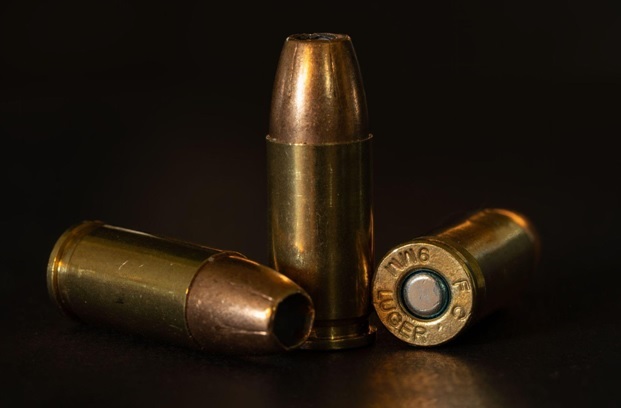Using the right type of ammo, depending on the circumstances, is a matter not only of efficacy, and cost, but of safety.
For instance, handgun hunting with jacketed bullets is, on the whole, both impractical and dangerous. Depending on your state’s code, it might also be illegal.
Anyway, you also don’t want to waste valuable hollow points target shooting for no good reason (unless you are simply testing them out in your handgun), which makes the same point.
This raises the issue of different handgun ammunition types, the main categories of which will be covered in this post, focusing on 9mm, one of the most popular handgun cartridges in the world.
9mm Full Metal Jacket
One of the most common types of 9mm ammo is 9mm full metal jacket ammo, which may also be referred to as FMJ or 9mm FMJ.
This is a type of ball ammo (that is, ammo with a solid core and nose) that has a jacket that fully encapsulates it from nose to base.
Most full metal jacket ammo is produced by drawing the jacket down from the nose, leaving the base exposed. This produces a bullet of relatively high radial symmetry that is stable and accurate.
It also produces a bullet with a hard nose (since it’s covered by the jacket), making it optimal for penetration characteristics.
The round nose also results in a smooth feeding ammo, especially since the 9mm has a round, blunt nose to begin with.
On top of that, 9mm full metal jacket is also very affordable by comparison with alternatives.
For all of these reasons, 9mm full metal jacket ammo is highly desirable for target shooting as it is consistent, reliable, accurate, and affordable. This makes it a good option for training and high-volume target shooting.
One thing to be aware of is that while FMJ ammo is great for these applications, as a general rule, it is not suitable for hunting or defensive applications.
Note: there are other jacketed bullets; some feature a TSJ, or total synthetic jacket, that helps minimize or eliminate copper fouling and which reduces lead exposure.
These are suitable for target training and competition as well, but do not offer the same penetration characteristics as FMJ ammo.
9mm Flat-Nose Ammo (AKA Wadcutter)
While 9mm full metal jacket ammo will work for most who practice high-volume target shooting or training, there are some instances in which a variant, known as 9mm flat-nose ammo (or wadcutter ammo) might be superior.
Basically, wadcutter ammo is functionally the same as FMJ ammo; it is fully enclosed in a copper jacket. The only difference is the point of the bullet is flattened out.
The reason for this design is to punch clean holes in paper targets, which makes scoring easier, as FMJ bullets tend to tear or leave ragged holes rather than punching a clean one.
Wadcutter ammo tends to be more expensive though, so if you intend to shoot it, save it for the competition.
9mm Hollow Point Ammo

A major alternative to FMJ ammo is 9mm hollow point ammo, which may also be jacketed, in which case it will be referred to as “jacketed hollow point” or JHP ammo.
Regardless, all hollow point ammo has a depression in the nose of the bullet. This causes the bullet to expand (disrupt) on impact with a soft target, creating a larger wound channel and greater tissue trauma, while also improving energy transfer characteristics.
This makes hollow point ammo the superior choice for hunting and defensive applications, like home defense or concealed carry, as it is more effective at neutralizing a threat while producing minimal risk of overpenetration.
At the same time, hollow point ammunition is usually loaded to higher pressures than FMJ and is typically also substantially more expensive. As a result, don’t waste it at the range for no good reason, unless you are expressly training for defensive carry - in which case you should.
Frangible 9mm Ammo
One last class of ammo we want to cover here is known as frangible 9mm ammo. Basically, frangible ammo is loaded with bullets that disintegrate into dust on impact with a hard target.
This limits their ability to penetrate a target and also makes them much safer for use in indoor ranges or with steel targets, as there is a much lower chance of ricochet.
Frangible ammo is sometimes preferred in these instances and some ranges might even have frangible-only rules - so that’s something to be aware of.
With that said, frangible ammo, like hollow point and wadcutter bullets, is usually more expensive than FMJ, and it has terrible penetration characteristics, so using it doesn’t make sense unless there is a safety concern.
Stock Up on 9mm Bulk Ammo
Need to restock the ammo cans? Do it here. Check out our 9mm bulk ammo deals and police trade-in specials. There are incredible finds in both collections.

